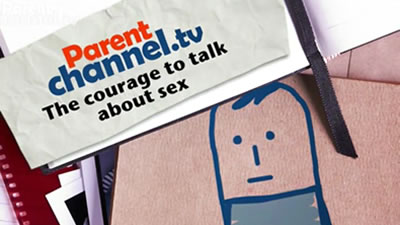 Go to main content
Go to main content
Archive Website of the UK government
Please note that this website has a UK government accesskeys system.
Main menu
Page menu
Video: talking to your child about sex
Learn how to talk to your child about sexual relationships.
Can't see the video?

To play this video you need Adobe Flash Player version 9 or higher on your computer and have JavaScript enabled on your browser. Our Help with video files page gives advice if you are unsure how to do this. The Flash software is free.
Text version
Paula Hall, Relate: "A lot of parents find it very difficult to talk about sex. To be honest we often find it difficult to talk about sex to anybody, let alone having to talk to your child about it.
"I think my tip would be one of the best ways of doing it is to actually rehearse the conversation first. Let yourself hear yourself saying: penis, vagina, clitoris, orgasm. They're words we're not used to hearing coming out of our mouth, so get comfortable with saying it."
The earlier you talk to your child about sex, the less likely they are to engage in sex at an early age
First parent: "I didn't come across any of those points because they had already learnt about it at school."
Second parent: "One of the things that really gets me is that a lot of the parents seem to think it's the school's responsibility to educate children in that way. And I think it's got a lot to do with what you as a parent actually teach them."
Third parent: "We're an open family. When they reached 11 - which is the two boys - they were told about sex and what will happen to their bodies. And by doing that I think they're brainy enough not to go out and get a girl pregnant."
David Kesterton, Fpa: "All children will receive some sex and relationships education at school. But the conversations that happen in the home can come at all kinds of times - maybe like watching the television together or when you're out and about at the supermarket. It's at those times that as a parent it's really good to be able to respond in a positive and reassuring way to the questions your children ask."
Talk to your child about the emotional aspects of sex as well
Paula Hall: "If you can be open talking about relationships generally, then it will make it a lot easier for your child to talk about relationships.
"Do it in an environment where you don't have to be face to face. Actually having eye to eye contact and talking about penises and vaginas can be much more embarrassing. So maybe if you know you've got a car journey planned or go for a walk - somewhere where actually you're side by side rather than face to face, which can feel far more intimidating and embarrassing."
Stress the positives as well as the problems
David Kesterton: "It's part of being a human being, something to be celebrated and hopefully, something that will be a positive part of your child's life as they grow up."
Fourth parent: "They hear things at school, sometimes they just want you to clarify if for them. No, I'm not embarrassed at all because I think children need to know you understand and you're listening."
Safe sex and contraception will be taught at secondary school - find out your school's sex education policy
Third parent: "That's where some parents are going wrong, because they're the ones that go 'Umm... I don't want to talk about that.' They'll say 'We'll talk later' or 'We'll talk another day about that'. Then they go out onto the streets and find it for themselves."
Paula Hall: "Most parents know they need to have this conversation at some stage, so when you have had that conversation most parents say they feel much more better about it. But do make sure it's not just a one-off event. Make sure that it's a conversation your child knows they can come back to any time."
Useful tips:
- rehearse the key words
- find a relaxed time to talk
- try not to put off talking about sex to your child